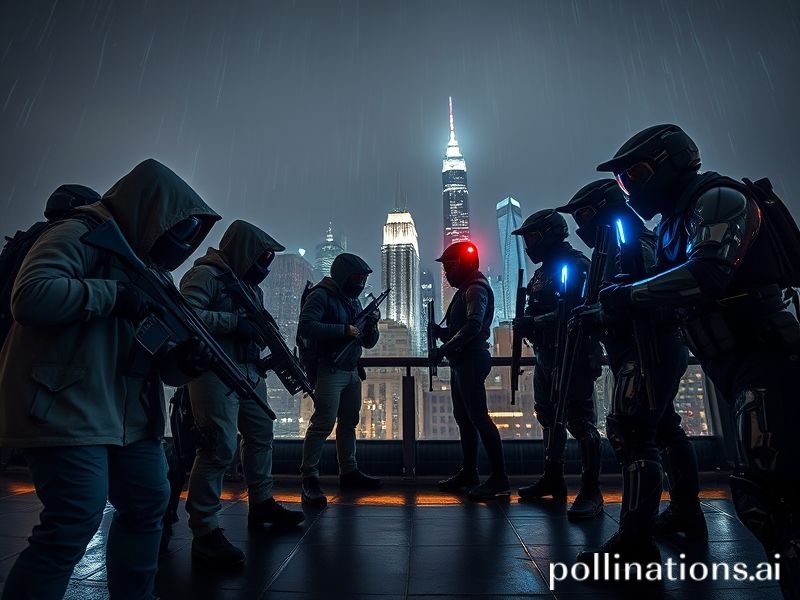Rangers vs Guardians: The $1.3 Trillion Global Brand War for Who Gets to Save Earth (Spoiler: Earth Isn’t Watching)
Rangers vs Guardians: A Global Power Struggle Rebranded
By the time you finish reading this sentence, three new “rapid-response task forces” will have been announced by governments that can’t reliably deliver mail. From the peat bogs of Borneo to the conference lobbies of Davos, the planet is suddenly awash in people who insist they are either rangers or guardians—never mere employees, mind you—tasked with protecting something allegedly priceless. The semantic skirmish looks trivial until you notice the budgets: $1.3 trillion a year sloshing around climate “rangers,” biodiversity “guardians,” anti-poaching “rangers,” cyber-“guardians,” and, in a particularly avant-garde twist, lunar heritage “guardians” paid by a consortium that still hasn’t figured out how to land softly on the moon.
In theory, rangers are kinetic, khaki-clad, and slightly sunburned; they patrol, they pursue, they occasionally get eaten. Guardians are contemplative, Patagonia-clad, and slightly hungover from last night’s TEDx reception; they curate, they convene, they occasionally issue press releases. One group carries rifles, the other risk matrices. Both carry PowerBanks.
Take the Congo Basin. There, French-funded “forest guardians” in mirror-shade sunglasses host Zoom workshops on stakeholder engagement while Ugandan-funded “wildlife rangers” wade through malaria-infested swamps after elephant poachers who now use thermal drones bought with the same cryptocurrency speculators who donate to the guardians’ NFT fund-raisers. The poachers, incidentally, refer to themselves as “resource redistribution specialists,” proving that everyone has branding consultants these days.
Move the lens to the Arctic, where Norwegian “ice rangers” rehearse polar-bear evasion tactics and Canadian “guardians of the permafrost” draft policy papers on culturally appropriate ice. Both groups share Instagram filters that make minus-40 look positively balmy. Meanwhile, the permafrost itself is busy exhaling millennia-old methane, entirely unimpressed by either title.
In Southeast Asia, Indonesia’s new Peatland Guardians (motto: “Not just mud, but heritage mud”) are locked in a turf war—literally—with Malaysia’s Peat Rangers, who claim the border is “a colonial cartographic hallucination.” The dispute is currently mediated by an app designed by a teenager in Estonia who specializes in augmented-reality cat games. The cats, at least, have nine lives; the peat has one, and it’s on fire.
The private sector has smelled opportunity. Luxury conglomerates now sell $3,000 parkas labeled “Ranger Edition” with detachable moral authority, while Silicon Valley start-ups offer “Guardian-as-a-Service” subscriptions—cloud-hosted stewardship, billed monthly, cancel anytime. If you pay extra, an algorithm will send you daily affirmations that you are, in fact, saving the planet one spreadsheet at a time.
Governments, never ones to miss a parade they can tax, have created hybrid roles. The Philippines just unveiled “Guardian-Rangers,” armed eco-cops who meditate before dawn raids. Mexico countered with “Ranger-Guardians,” community brigades that file environmental impact statements while dodging cartel bullets. Both programs are under review by the UN, which is currently debating whether to deploy Blue Beret Linguists to translate the job descriptions.
The darker joke is that the distinction doesn’t matter to whatever is supposedly being protected. Coral reefs bleach just as efficiently under ranger patrols as under guardian stewardship. Glaciers calve for the TikTok age regardless of who films them. The Anthropocene, ever the equal-opportunity apocalypse, devours semantics first and ecosystems second.
And yet the labels persist because humans need narrative more than oxygen—cheaper, too, at current market rates. Calling someone a ranger summons the romance of doomed frontiers; calling them a guardian evokes the gravitas of mythic custodianship. Both titles flatter our collective delusion that the planet is a petting zoo we can still negotiate with.
Conclusion: In the end, the global contest between rangers and guardians is less about protecting nature than about deciding who gets to narrate the collapse. The winners will write the post-mortem press release; the losers will be reincarnated as consultants. The rest of us are advised to pack sunscreen, a satellite phone, and an ironic sense of humor—because whether you’re guarded or ranged, the forecast is the same: partly catastrophic, with a chance of redemption sometime after the shareholder meeting.







